Portugal–Spain relations
Portugal–Spain relations describes relations between the governments of the Portuguese Republic and the Kingdom of Spain. The two states make up the vast majority of the Iberian Peninsula and as such, the relationship between the two is sometimes known as Iberian relations.
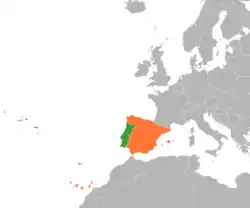 | |
Portugal |
Spain |
|---|---|
.png.webp)
In recent years, both countries have enjoyed a much friendlier relationship. Together, the two countries are full-time members of the European Union, Eurozone, Schengen Area and NATO.
Portugal and Spain had been rival sea powers as early as the 14th century. Portugal initially was in a position to explore the area facing the Atlantic and adjacent to the African coasts. In successfully doing so, it discovered that Africa has been the Arab world's major source of gold brought by camel caravans across the Sahara. This prompted Prince Henry to send expeditions farther south along the Africa coast. Bartolomeu Dias and his crew found themselves sailing in the eastern coast of Africa after a South Atlantic gale blew their ships around the southern tip of the African continent. This passage is now known as the Cape of Good Hope. An expedition headed by Vasco da Gama was sent on a diplomatic and trade mission to India. He followed the route of Dias until he reached Malindi (Kenya) in East Africa. Da Gama bombarded the town and took Indian hostages.
Portugal was able to establish a commercial post in Cochin, a port southwest of India. In 1509, another Portuguese explorer, Diogo Lopes de Sequeira, successfully reached Malacca, an important trade center in Southeast Asia.
Spain came into the scene a few years later. After completely defeating the last Moorish (Muslim) stronghold on the Iberian peninsula, King Ferdinand and Queen Isabela directed their attention to the search for new territories overseas.
Spain was convinced that it had finally reached Asia with the expedition undertaken by Christopher Columbus, this expedition was tremendously important because they arrived in the Americas, an immense and highly unknown territory that began an era of exploration and conquest whose Spanish soldier-explorers, called 'Conquistadors', explored much of the interior territory of the New World. The Spanish Vasco Núñez de Balboa reached the Pacific Ocean for the first time crossing the Isthmus of Panama. Ferdinand Magellan, a Portuguese navigator, convinced Charles I of Castile (Habsburg) to finance an expedition exploring the Pacific Ocean. Magellan was killed in Mactan (now Lapu-Lapu, Philippines) by its ruler, but the Spanish explorer Juan Sebastián Elcano and his remaining crew were able to continue the voyage, following Magellan's plan and bringing the good news of their circumnavigation of the world to Castile.
Country comparison
| Portugal Portuguese Republic (República Portuguesa) |
Spain Kingdom of Spain (Reino de España) | |
|---|---|---|
| Flag & Coat of arms |  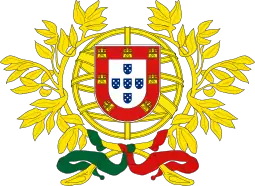 |
 .svg.png.webp) |
| Population | 10,295,909 (2020) | 47,431,256 (2020) |
| Area | 92,212 km2 (35,603 sq mi) | 505,990 km2 (195,360 sq mi) |
| Population Density | 114.5/km2 (205/sq mi) | 94/km2 (243/sq mi) |
| Government | Unitary semi-presidential constitutional republic | Unitary parliamentary constitutional monarchy |
| Capital | ||
| Largest City | ||
| Official language | Portuguese | Spanish |
| First Leader | Afonso I of Portugal (1139-1185) | Ferdinand II of Aragon (1475–1516) and Isabella I of Castile (1451-1504) |
| Current Head of Government | Prime Minister António Costa (PS; 2015–present) | Prime Minister Pedro Sánchez (PSOE; 2018–present) |
| Current Head of State | President Marcelo Rebelo de Sousa (2016–present) | King Felipe VI (2014–present) |
| Main religions | 81.0% Catholic 8.3% Undeclared 6.8% No Religion 3.3% Other Christians |
61% Catholic 35% No Religion 3% Other Religions 1% Undeclared |
| Ethnic groups | 95.3% Portuguese 4.7% Others |
89.7% Spaniards 10.33% Others |
| GDP (nominal) | $243.229 billion $23,731 per capita |
$1.440 trillion $30,734 per capita |
| GDP (PPP) | $358.070 billion $34,935 per capita |
$2.016 trillion $43,007 per capita |
| Currency | Euro (€) – EUR | Euro (€) – EUR |
| Human Development Index | 0.864 (high) - 2019 | 0.904 (very high) - 2019 |
History
Reconquista
After the Umayyad conquest the Iberian Peninsula, a long process of reconquest (in Portuguese and Spanish: Reconquista) began. The Battle of Covadonga and the establishment of the Kingdom of Asturias are often regarded as the starting points of this process. Several Christian kingdoms emerged in the peninsula thereafter.
The County of Portucale, successively a vassal of the kingdoms of Asturias, Galicia, León, eventually rebelled and won Battle of São Mamede on 24 June 1128, lead by Afonso Henriques, who, after defeating the Moors in the Battle of Ourique, proclaimed himself King of Portugal on 25 July 1139. Portugal's independence was recognized in 1143 by King Alfonso VII of León and in 1179 by Pope Alexander III. Portugal's Reconquista finished in 1249.
Spain began with the Union of the crowns of Castile and Aragon in 1479, although it was not until 1516 when they had a single unified King. Until then the word Hispania was only a geographic location referring exclusively to the Iberian peninsula. It was only in the constitution of 1812 that the name "Españas" (Spains) was adopted for the country along with the use of the title of "king of the Spains". The constitution of 1876 adopts for the first time the name "Spain" for the Spanish state and from then on the kings would use the title of "king of Spain". The Reconquista was finally over with the Fall of Granada in 1492.
An attempt to unite all Iberian medieval kingdoms failed with the death, in 1500, of Miguel da Paz, Prince of Portugal, Asturias, Girona and Viana.
Overseas expansion
Portugal's copy of the Treaty of Tordesillas (1494) divided the New World between Portugal and Castile. During the 15th century, Portugal built increasingly large fleets of ships and began to explore the world beyond Europe, sending explorers to Africa and Asia. Castile followed suit decades later. Following the first Spanish voyage of Christopher Columbus to the Caribbean in 1492, both states began acquiring territory in the New World. As a result of the 1494 Treaty of Tordesillas, Portugal acquired its most potentially important colony, Brazil (much of the South American continent), as well as a number of possessions in Africa and Asia, while Castile took the rest of South America and much of the North American continent as well as a number of possessions in Africa, Oceanía and Asia as the important colony of the Philippines. This line of demarcation was about halfway between the Cape Verde Islands (already Portuguese) and the islands claimed for Castile by Columbus on his first voyage. Although the Treaty of Tordesillas attempted to clarify their empires, many subsequent treaties were needed to establish the modern boundaries of Brazil and the 1529 Treaty of Zaragoza was needed to demarcate their Asian possessions.
Iberian Union
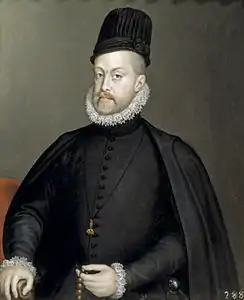
| War of the Portuguese Succession | |||||||||
|---|---|---|---|---|---|---|---|---|---|
| Part of the Portuguese succession crisis of 1580 | |||||||||
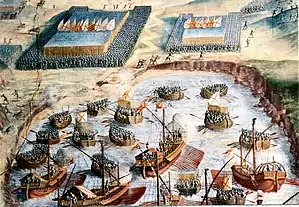 Habsburg Tercios landing at the Battle of Ponta Delgada | |||||||||
| |||||||||
| Belligerents | |||||||||
|
|
| ||||||||
| Commanders and leaders | |||||||||
|
|
| ||||||||
In 1578, King Sebastian of Portugal died in the Battle of Alcácer Quibir against the Moroccans and the Turks. Having no heirs, he was succeeded by his great-uncle Henry of Portugal, who reigned until his death (31 January 1580).
Henry also lacked heirs and his death triggered a succession crisis, where the main claimants to the throne were Philip II of Spain and Anthony, Prior of Crato. After the Spanish victory in the War of Portuguese Succession Philip of Spain was crowned king in 1581, beginning a personal union between the two nations known as the Iberian Union generating a decline of the Portuguese Empire during the period of Union. The Iberian Union lasted for almost sixty years until 1640, when the Portuguese Restoration War was initiated against Spain and Portugal reestablished the Portuguese dynasty under the Bragança.
18th century
During the wars of the 18th century, which were often fought by the major powers to maintain the European balance of power, Spain and Portugal usually found themselves on opposite sides. The Portuguese, courtesy of their long-standing alliance, aligned themselves with Great Britain, while Spain, through the Bourbon Family Compact, allied themselves to France. In 1762, during the Seven Years' War, Spain launched an unsuccessful invasion of Portugal.
In 1777 there was a conflict between the two states over the borders of their possessions in South America.
19th century and Napoleonic era
The War of the Oranges (Portuguese: Guerra das Laranjas; French: Guerre des Oranges; Spanish: Guerra de las Naranjas) was a brief conflict in 1801 in which Spanish forces, instigated by the government of France, and ultimately supported by the French military, invaded Portugal. It was a precursor to the Peninsular Wars, resulting in the Treaty of Badajoz, the loss of Portuguese territory, in particular Olivenza, as well as ultimately setting the stage for the complete invasion of the Iberian Peninsula by Spanish and French forces.
In 1807, the king of Spain and his French allies invaded Portugal successfully and unusually quickly, using a route that crossed through Spanish territory. However, the French decided to take over both countries, overthrowing the King of Spain and forcing the Portuguese royal family to escape to the Portuguese colony of Brazil. Spain and Portugal subsequently became allies for the first time in centuries and, allied to a British army under Sir Arthur Wellesley, drove the French back across the border in 1813 after a prolonged, brutal conflict known as the Peninsular War.
After the fall of Napoleon, both countries came close to war a number of times during the early 19th century. Both lost their American colonies shortly after the end of the Peninsular War, which severely weakened their global power.
1930s
The 1930s saw similar right-leaning, authoritarian and nationalist regimes emerge in both countries. In Portugal, António de Oliveira Salazar established his Estado Novo in 1933. In 1936, Francisco Franco launched a rebellion against the Spanish government and after three years of civil war, his nationalists were triumphant.
Both states remained neutral in World War II, though Spain was more predisposed to Nazi Germany. Portugal also maintained a friendly relationship with Nazi Germany, supplying it with many key resources such as tungsten. Yet in virtue of the 14th century alliance Portugal had with England, it was also supplying Britain with all sorts of produce and whilst the Germans had to pay immediately, Britain had an open account for most of the war.
World War II came to a close in 1945, with the Allies victorious, the two states of Portugal and Spain became increasingly isolated with their governments rooted in the old war, as authoritarian dictatorships, rather than the democracy that was being established or re-established throughout the rest of Western Europe.
While the other European colonial powers, such as France, Britain and the Netherlands, gave up their colonial empires in the post-war years, both Spain and Portugal clung to their possessions around the globe. Portugal fought a costly colonial war in Africa and in 1961 saw its territory of Goa invaded by India. Despite their apparent mutual self-interest, there was very little co-operation between Spain and Portugal when it came to defending their empires.
End of isolation
In 1974 the dictatorship of the Estado Novo was brought to an end by a military coup known as the Carnation Revolution. This left Spain increasingly isolated from the rest of Europe, which lasted until the death of Franco a year later, after which Spain returned to being a constitutional monarchy and embraced parliamentarism. The PREC that had followed the Carnation Revolution in Portugal came to an end in 1976 and Portugal also became a democracy. The two democracies signed the Treaty of Friendship and Cooperation between Spain and Portugal in 1977, replacing the Iberian Pact which was signed in 1939, whilst both countries were autocratic.[5]
The two states gave independence to their former colonies, liberalized their economies and began the process of applying for membership of the European Economic Community. In 1986 the two states formally entered the Community, which is now known as the European Union, pursuant to the ratification of the Treaty of Lisbon.
Present
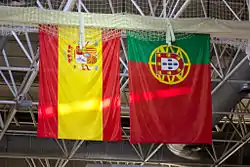
Current relations between Spain and Portugal are outstandingly good. They cooperate in the fight against drug trafficking and forest fires (common in the Iberian Peninsula in summers), for example. These close relations are facilitated by similar governments; such as the conservative governments of José María Aznar and José Manuel Durão Barroso and the social democratic governments of José Luis Rodríguez Zapatero and José Sócrates and between Pedro Sánchez and António Costa. Sócrates even claims that he has one of the best personal relations with Zapatero among international political relationships.
In 1998, both countries signed the Albufeira Convention, an agreement on the sharing of trans-boundary rivers such as the Douro, Tagus and Guadiana. The convention superseded an original agreement on the Douro, signed in 1927, that was expanded in 1964 and 1968 to include tributaries. The Albufeira Convention governs the equitable use of water and environmental concerns.[6]
In 2009, the two countries submitted an unsuccessful joint bid to either host the 2018 or the 2022 FIFA World Cup.
In 2020, Portugal Prime Minister Antonio Costa criticised the words of Dutch Finance Minister after he called for an investigation into Spain's proclaimed lack of budgetary capacity to cope with the COVID-19 pandemic, describing them as "repugnant".[7] The same year, both countries also held a solemn border opening ceremony, which had been closed due to the COVID-19 pandemic crisis.[8]
Later disputes
Olivença / Olivenza
There is an unsettled territorial dispute on the Portugal-Spain border regarding the municipality of Olivenza / Olivença and the smaller town and municipality of Táliga, both currently administered as a part of the province of Badajoz, in the Spanish autonomous community of Extremadura. Olivenza / Olivença had been under continuous Portuguese sovereignty since prior to 1297 when it was occupied by the Spanish in 1801 and formally ceded by Portugal later that year by the Treaty of Badajoz. Spain claims de jure sovereignty over Olivenza / Olivença on the grounds that the Treaty of Badajoz still stands and has never been revoked.
Portugal claims de jure sovereignty over Olivenza / Olivença on the grounds that the Treaty of Badajoz was revoked by its own terms (which stated: the breach of any of its articles would lead to its cancellation) when Spain invaded Portugal in the Peninsular War of 1807 and, foremost, due to the fact that Spain signed the Treaty of Vienna in 1815, which according to Portugal recognizes Olivenza / Olivença as Portuguese territory.
Savage Islands territorial water
Recently, Spain has also initiated a diffuse dispute regarding Portugal's Exclusive Economic Zone in the territorial waters of the Savage Islands (a small archipelago north of the Canary Islands), under Portuguese sovereignty. Spain objects on the basis that the Savage Islands do not have a separate continental shelf,[9] according to the article 121[10] of the United Nations Convention on the Law of the Sea. The status of the Savage Islands as islands or rocks is thus at the core of the current dispute, mainly due to Spanish aspirations for fishing and mineral exploration. Today the Savage Islands constitute a natural reserve whose inhabitants are a small Portuguese Marine Corps combat detachment[11] and two wardens of Madeira's Natural Park. Over the years the Portuguese authorities have seized some Spanish fishing boats and crew around the area for illegal fishing and theft of light beacons and navigation buoys.[12]
Almaraz Nuclear Power Plant and nuclear storage
As of 2017 Spain had approved a nuclear waste warehouse next to the Almaraz Nuclear Power Plant (which uses the Tagus river that flows into Portugal for cooling of the reactors), which is near the Portugal–Spain border, without carrying out any consultations or impact studies. Portugal has escalated the matter to the EU. Protests were planned for January 12, 2017 at Spanish consulates, organised by Movimiento Ibérico Antinuclear,[13] which coincided with a meeting between Portuguese and Spanish delegates in Madrid, which ended in deadlock and Portugal to complain to the EU that Spain ignored the potential cross-border impact with no studies being carried out, which is against European Union rules according to Portugal.[14][15][16][17]
Spanish secretary of State for the EU Jorge Toledo Albiñana has said work will start regardless of Portugal's complaints and uranium bars that will remain radioactive for the next 300 years will be stored on-site.[18]
Resident diplomatic missions
- Portugal has an embassy in Madrid, consulates-general in Barcelona and Seville, and a vice-consulate in Vigo.[19]
- Spain has an embassy in Lisbon and a consulate-general in Porto.[20]
 Embassy of Portugal in Madrid
Embassy of Portugal in Madrid Consulate-General of Portugal in Barcelona
Consulate-General of Portugal in Barcelona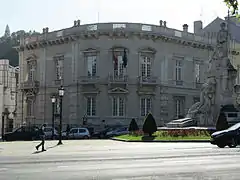 Embassy of Spain in Lisbon
Embassy of Spain in Lisbon
See also
Further reading
- Vicente, António Pedro (2003). Espanha e Portugal: Um olhar sobre as relações peninsulares no século XX. Tribuna da História. ISBN 9789728799014.
References
- Geoffrey Parker p.35
- Geoffrey Parker p.73
- Nascimiento Rodrigues/Tessaleno Devezas p.122
- Geoffrey Parker p.73
- Chipman, John (2004-01-14). NATO's Southern Allies: Internal and External Challenges. Routledge. p. 117. ISBN 978-1-134-98774-0.
- "Spanish-Portuguese Albufeira Convention". United Nations. Retrieved 18 February 2015.
- Network, EURACTIV (2020-03-30). "Portugal slams Dutch finance minister for 'repugnant' comments". www.euractiv.com. Retrieved 2020-04-25.
- Periódico, El (2020-07-01). "Las fronteras terrestres entre España y Portugal, abiertas otra vez". elperiodico (in Spanish). Retrieved 2020-09-12.
- Lacleta Muñoz, José Manuel: "Las fronteras de España en el mar". Documentos de trabajo 34-2004, Real Instituto Elcano
- United Nations Convention on the Law of the Sea, Part VIII, Article 121
- "Historial" (in Portuguese)
- Carvalho, Luis and Leitão, Nuno, A Noção "Estratégica" das Ilhas Selvagens (in Portuguese) Archived 2008-02-23 at the Wayback Machine
- "FECHAR ALMARAZ". Retrieved 17 January 2017.
- "Environmental groups to protest at Spanish Consulate over nuclear plant". Retrieved 5 January 2017.
- "Governments of Portugal, Spain meet today to discuss Almaraz". Retrieved 12 January 2017.
- "Portugal to complain to EU about Spanish nuclear waste project". Retrieved 17 January 2017.
- "Portugal to complain to EU over Spain's planned nuclear dump site". Retrieved 17 January 2017.
- "Nuclear waste dump on Tejo river begins construction "in next few days"". Archived from the original on 9 April 2017. Retrieved 17 January 2017.
- Embassy of Portugal in Madrid
- Embassy of Spain in Lisbon